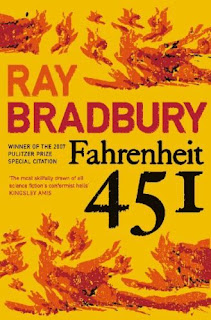Science Fiction does an important job of keeping the institutions in society honest. In a world with too few whistleblowers, sci-fi sends off regular warning shots about a range of problems, including corporate greed, environmental concerns, military practices, technological application, and identity politics.
Though I love all science fiction, some of it isn't all that impressive at addressing social issues. For instance, during the dime-novel era of the early 20th century, in the science fiction of male escapism virile men save uber-virile women from mutated monsters serving as stand-ins for the feared ideologies of the day. That sort of science fiction fueled sf magazines for a few early decades of the 20th century but did little to fuel new thinking.
Science Fiction and Male Escapism
Though I love all science fiction, some of it isn't all that impressive at addressing social issues. For instance, during the dime-novel era of the early 20th century, in the science fiction of male escapism virile men save uber-virile women from mutated monsters serving as stand-ins for the feared ideologies of the day. That sort of science fiction fueled sf magazines for a few early decades of the 20th century but did little to fuel new thinking.
In contrast, the best science fiction since the ’50s functions as a foundry for new ideas, for new strategies to improve our social and technological landscape. No, science fiction isn’t strictly real, but science fiction offers us a way of seeing how the world is changing and will change so we can respond intelligently to the problems of today and tomorrow.
Ray Bradbury’s Fahrenheit 451
In the ’50s, Ray Bradbury’s Fahrenheit 451 questioned the future of democratic society, positing that the only future for democracy is one in which our major institutions are held accountable for their misdeeds. In Bradbury’s fictional America, citizens had stopped reading. The end of reading wasn’t a state-backed or corporate-backed conspiracy, but these powerful institutions responded to an absence of a reading public for their own gain. Corporations tailored products to exploit the new non-reading society. The state more easily indoctrinated their subjects to enforce conformity. Bradbury’s critique of powerful institutions in American society still serves as a warning about the need for self-reliance and the need to keep powerful institutions accountable to the public. We still face the specter of a public ignorant to the abuses of powerful institutions. The FaceBooks of our day exploit users and our politicians make misleading and outright false claims to constituents.Frank Herbert's Dune
In the ’60s, Frank Herbert’s Dune brought needed environmental questions to the fore. Americans had been polluting their environment for far too long without giving thought to the consequences of laissez-faire industrialization. The first factory in America, a cotton spinning mill built in 1790, jump-started what would become a vigorous market-based economy, but by the 1960s, Americans were dealing with radioactive fallout from testing nuclear weapons, dangerous levels of carbon dioxide from industrial pollution, exposure to carcinogens from a myriad of industries, including rubber making, furniture making, metal industries, mining, farming, fishing, and more, ad nauseam. In Dune, a planetologist declares that “the highest function of ecology is understanding consequences.” Such thinking had been rare up to that point — the very first federal law to address pollution had come in 1955 with the Air Pollution Control Act which merely researched air pollution and left legislation to individual states. Still, Herbert’s book was an imperative to look hard at American practices that harmed the environment. Today’s climate change deniers would do well to pick up Dune and consider the words of Herbert’s planetologist.William Gibson's Neuromancer
Sometimes science fiction unifies the aims of improving the social and technological landscape. Consider William Gibson’s Neuromancer. This book is well known for its depiction of a cyberspatial environment populated by powerful institutions and dudes with slacker constitutions. But Gibson also wrote powerful women that used cyberspace as a way to reclaim identity and agency. Gibson’s cyberspace was itself a hack for equality between institutions and individuals, men and women.Bruce Sterling
Today, writers like Bruce Sterling question our military-industrial complex. What will result from current AI research? Are we foolish enough to believe that AI will only be used to help write better pop songs and concoct better sodas or do we take on Sterling’s more critical view that soon enough, drones with minds of their own will carry on covert assassinations from Tuscaloosa to Timbuktu, Phnom Penh to Panama City.
Ren Warom: Escapology
Ren Warom, in Escapology, presents a world where individuals choose to undergo hormonal and surgical gender therapy as early as childhood, giving individuals the freedom to choose their identity. But the greater social problem that Warom identifies is that in our society, men are given more opportunities, earn more money than women, and are victimized less. Warom’s lead character, Shock — does it shock you that someone would make this gender switch? — it shouldn’t — makes the switch to avoid the negative issues women face and benefit from being male in a society that unfairly values men over women.The Literature of Ideas
Science fiction is the literature of ideas, ideas for understanding and solving social and technological problems. Writers like Kim Stanley Robinson, Arthur C. Clarke, Carl Sagan, Octavia Butler, and Ursula K. Le Guin have left us guidebooks for how humans can navigate their present-as-it-becomes-future. Let’s learn from them.
Ready for more Rapid Transmissions?



